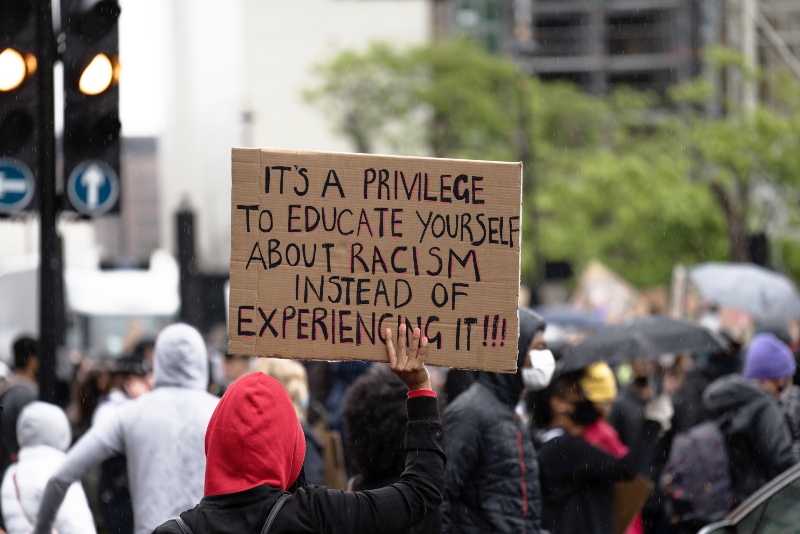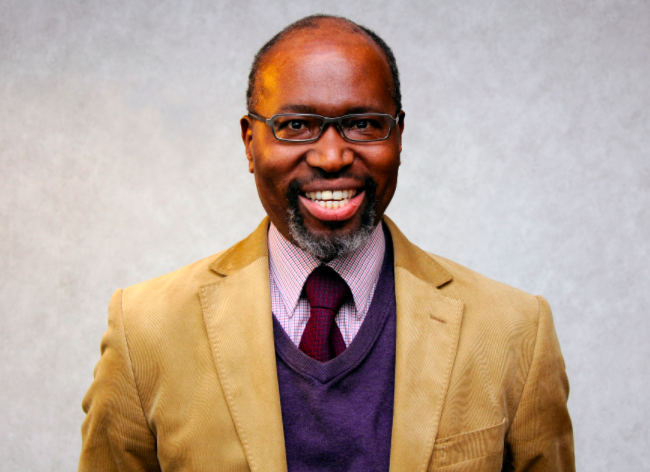Black Lives Matter
Joe Kapolyo shares a historical, sociological and theological perspective

Introduction
Black Lives Matter (BLM) is an international movement highlighting the struggle of black people, and in the words of one of Africa’s most acclaimed champion of black freedom, ‘inspired by their own suffering and their own experience. It is a struggle for the right to live.’ (Mandela 1965:169). This struggle is fought in the context of the ubiquitous white privilege; a platform that privileges most white people and enhances their prospects over against black people. While concern has been expressed about some of the specific statements of the Black Lives Matter Foundation, Inc (the organisation founded in 2013), #BlackLivesMatter has in recent months become a galvanising force in the struggle for racial justice, uniting people around the world in condemnation of systemic racism and police brutality against Black people.
George Perry Floyd Jr’s murder, at the hands of racist police on the streets of Minneapolis on 25 May 2020, shone a light, and not for the first time, on a centuries old problem in the relationship between white people (whiteness) and black people (blackness). This is not just an American problem, it happens on the streets of London on a daily basis where particularly young black men are subjected to dreadful and humiliating treatment at the hands of the police. A twenty something year old, as he was then, former colleague and friend in north London, was regularly stopped and searched simply because he, a young black man, drove a brand-new smart car. Racially biased arrests based simply on racial profiling are very common (if a black man drives a nice car, he is deemed by the police to be a criminal).
In general, whiteness, and therefore white people, whoever they are, whether they desire the status or not, are seen as, and often behave as, superior to all black people, for white supremacy demands black inferiority. One of the consequences of this situation is that all too often white people are endowed with authority over black people. In many cases, as in those cited above, white police act with impunity and seem to believe that they have power not just to accuse, but to arrest, adjudicate, judge and execute over all black people.
There are a million and one other minor daily indignities that most, if not all black people suffer; stop and search, school exclusions, over representation in mental health and prison or correctional institutions, not to mention glass ceilings in most career paths. One white writer says, ‘Whether I use cheques, credit cards, or cash, I can count on my skin colour not to work against the appearance of financial reliability’ (McIntosh 1988). The point she is making is that the converse is true for all or most of black people and in all or most areas of human enterprise.
I wish to briefly explore this subject from three perspectives: historical, sociological and theological and then suggest some practical applications and helpful literature for further exploration.
Historical
The problems go back to the Transatlantic Slave trade. From antiquity through the medieval period, the relationship between whiteness and blackness was an ‘acceptance of “different but equal”’ (Davidson 1994:11). But all this changed in the 17th century. Plantation owners considered chattel slavery as a business and the victims were merely pawns in a corrupt economic game of debauchery, cross breeding, inter-racial rape and mental conditioning of a black race, they considered sub-human. ‘… slaves became dehumanised chattels whose cost of replacement grew increasingly smaller as the years went by; smaller, that is, in relation to the market value of their product and sometimes in the case of their replacement … the old attitude of different but equal vanished from the scene. In its place came the attitude that has taken the difference as being deviant [and inherently] inferior…’ (Davidson 1994:12).
In 1712, on the banks of the James River in the State of Virginia in the USA, a slave owner by the name of Willie Lynch, from whom we derive the term lynching, published his philosophy for controlling slaves, in a letter he called a ‘fool proof method for controlling your black slaves’ (the letter is reproduced in a booklet entitled ‘The Willie Lynch Letter and The Making of a Slave’ published by Lushena Books Inc.:
-
I use fear, distrust and envy for control purposes
-
Aim to have all your white slaves and overseers distrust all blacks
-
But it is necessary that your slaves trust and depend on us. They must love, respect and trust only us.
-
Segregate all the slaves on basis of age, gender, skin colour, place of work, any kind of peculiar differentiation and sow seeds of distrust between them all.
-
Lynching should be the weapon of last resort.
-
Disrupt the natural state of the slave, break them like one does with horses, cross breed them to produce the desired variety, etc.
Colonialism may not have been as extreme as chattel slavery, but it had some of the same principles as demonstrated by Belgium’s King Philippe’s apology (3.7. 2020) to the people of the Congo for the excesses and cruelty of his predecessors in what was called Belgian Congo, now the Democratic Republic of Congo (DRC).
South of the Congo, the British and the Portuguese fared no better as Nelson Mandela demonstrates in his Rivonia trial speech: ‘Legislation designed to preserve White supremacy entrenches this notion [White supremacy implies Black inferiority]. Menial tasks in South Africa are invariably performed by Africans. When anything has to be carried or cleaned the white man will look around for an African to do it for him, whether or not the African is employed by him. Because of this attitude, whites tend to regard Africans as a separate breed’ (Mandela 1965:168). In Northern Rhodesia (now Zambia) where I grew up, racial segregation was rigid and legally enforced, with white people at the top of the food chain and black people at the bottom. Segregation affected residential areas, work (only manual work and lowly clerical jobs were available for most Africans – the only thing the black man must sell is his labour), and education. In South Africa, the Apartheid government would spend R 145 on white children’s education compared to R 12 on their black counterparts. Similar provisions applied in the colonies north of the Limpopo. In fact, the Northern Rhodesia Government only started investing in black education in the mid 1940s. Up until then all black education was provided by missionary organisations.
Such education as was provided has proved retrogressive in the long run. Imported and adapted curricula had no place for study and analysis of African cultures; values, beliefs and world view. Instead, all education since then has excluded any serious interaction between Africans and their cultural backgrounds. Gordon Molyneux says, ‘Imperial western values and concepts … were at one and the same time opening to African societies the intellectual and economic means of [modern] nationhood and also creating a universe where their traditional world view found no place’ (Molyneux 1995: 26-27).
Sociology
Rapport and Overing state that, culture was set in the framework of ‘the social evolutionary thought linked to Western imperialism’ where ‘culture in the singular assumed a universal scale of progress and the idea that as civilisations developed through time, so too did human kind become more creative and more rational’ (Rapport and Overing 2007:110). The continuum ran from the most primitive (black people) to the most civilised (Europeans). These mistaken European intellectual notions of culture, prevalent in the eighteenth and nineteenth centuries, were married to concepts of ‘linear metanarratives of development and progress and the prominence of empire ideology’ (Ferguson 1999:16 cf. Kapolyo 2019:10-11). The European empires, Belgium, Britain, France, Holland, Portugal, Spain were marked by ‘a distinct cultural domination and penetration which has created the myth of the West as superior other, a myth which is continually evoked in international disputes and in political, cultural and theological discourses’ (Sugirtharajah 2005:2).
Theological
The distinction, in the academy, between theology and contextualised theologies, a distinction where theology is privileged over against so called contextualised theologies, is a fallacy. All life is contextualised, and therefore all theologies, including the standard systematic, biblical, philosophical and historical are contextualised. Therefore, the creation of a separate category entitled ‘contextualised theologies’, which by comparison has inferior status on the curricula, is at best an instrument of exclusion and at worst, an instrument of oppression in our Christian colleges and universities. The exclusion from theological discourse of the riches of the cultures of the majority world impoverishes not only the theological enterprise, but the Christian church and humanity at large. Each culture has deposits of divine grace which are there to inform, instruct and enrich for the flourishing of all humanity.
All human beings, irrespective of colour or ethnicity, are made in the image of God and therefore bear the stamp of his personhood (Genesis 1:26-27), and for this reason, they are worthy of full acceptance as equals, respect, protection and support. In Christ all barriers are banished, all human beings are different but equal (see Ephesians 2:14, Colossians 3:11, Revelation 7:9).
Conclusions
It is imperative that police behaviours be more strictly regulated outwardly by legislation and equitable recruitment, and inwardly by appropriate forms of training.
‘For me white privilege has turned out to be an elusive and fugitive subject. The pressure to avoid it is great, for in facing it I must give up the myth of meritocracy. If these things are true, this [USA and by implication, all other Western countries] is not such a free country; one’s life is not what one makes it, many doors open for certain people through no virtues of their own’ (McIntosh 1988).
It is not enough to state that one is not a racist. We must all be anti-racist.
At a very personal level, I have one simple test; of all my closest friends, how many do not share my ethnic or racial profile? If all my close friends share my race and ethnicity, I am part of the problem not the solution.
Image | James Eades | Unsplash
 Joe Kapolyo is a retired Baptist minister with extensive pastoral experience in Africa and the UK. He is a former principal of two theological colleges including All Nations Christian College. He has published a commentary on Matthew and a couple of other books.
Joe Kapolyo is a retired Baptist minister with extensive pastoral experience in Africa and the UK. He is a former principal of two theological colleges including All Nations Christian College. He has published a commentary on Matthew and a couple of other books.
This feature appears in the Autumn 2020 edition of Baptists Together magazine
References
Davidson B 1994, The Search for Africa, James Currey, London
Ferguson J 1999, Expectations of Modernity, Berkeley, London / University of California Press
Kapolyo J 2019, Theology and Culture: An African Perspective, Whitley Publications, Regent’s Park College, Oxford
Lushena Books, Bensenville, IL 60106
Mandela N 2002, No Easy Walk to Freedom, Penguin Books, London, first published by Heineman Educational Books in 1965
McIntosh P 1988, “White Privilege and Male Privilege: A Personal Account of Coming to see Correspondences through Work in Women’s Studies”, in Working Paper 189, Wellesley College Centre for Research on Women, Wellesley MA 02181
Molyneux K G 1993, African Christian Theology, Mellen Research University Press, San Francisco, CA
Rapport N and Overing J 2007, Social and Cultural Anthropology: Key Concepts, Rouledge, London
Sugirtharajah R S 2005, The Bible and Empire, Cambridge University Press, Cambridge, England